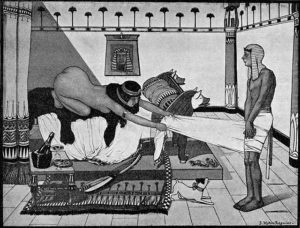 Have you ever heard the term antihero? Are you familiar with its meaning? Here’s a great definition from the Master Class website:
Have you ever heard the term antihero? Are you familiar with its meaning? Here’s a great definition from the Master Class website:
You won’t mistake an antihero for a role model, but antiheroes often feel the same sense of justice a traditional hero might. An antihero is deeply flawed, conflicted character, who often has a cloudy moral compass—but that’s what makes them realistic, complex, and sometimes even likable. (From: 4 Tips for Writing Antiheroes: How to Create an Unforgettable Antihero)
I sure wish I’d found that description BEFORE I wrote–and rewrote (FOUR TIMES)–the very complex character of Potiphar’s wife.
Why Did I Choose To Write About Potiphar’s Wife?
I actually started writing about Joseph. A couple of years ago, I felt a strong nudge to write a trilogy about one of my favorite Bible heroes, showing how his life embodied three concepts:
- Chosen
- Chained
- Champion
 I needed strong leading ladies to make the story compelling. To show Joseph as chosen, I wrote The Reluctant Rival: Leah’s Story (Guideposts Books, 2021). To depict the drama of Genesis 40-47–Joseph as champion–I’m writing about his Egyptian wife, Asenath, in Of Feast or Famine (Waterbrook & Multnomah, Spring 2023). These two women could have some rough edges, to be sure, but history and Scripture made it easy to buff off those prickly spots with some redemptive fiction.
I needed strong leading ladies to make the story compelling. To show Joseph as chosen, I wrote The Reluctant Rival: Leah’s Story (Guideposts Books, 2021). To depict the drama of Genesis 40-47–Joseph as champion–I’m writing about his Egyptian wife, Asenath, in Of Feast or Famine (Waterbrook & Multnomah, Spring 2023). These two women could have some rough edges, to be sure, but history and Scripture made it easy to buff off those prickly spots with some redemptive fiction.
It was obvious that the chained portion of Joseph’s life was a crucial part of his character and spiritual development. But Potiphar’s wife was a lecherous liar! Sheesh! Who would want to read a whole book about this woman?
Who Was Potiphar’s Wife?

Wikimedia Commons: “File:Joseph and Potiphar’s wife – J. Kuhn-Regnier 1910.jpg.”
She was like the star in a bad rerun of Desperate Housewives, and Joseph was the clean-cut pool boy she kept harassing. 🙄
“Now Joseph was well-built and handsome, and after a while his master’s wife took notice of Joseph and said, ‘Come to bed with me!’ But he refused. ‘With me in charge,’ he told her, ‘my master does not concern himself with anything in the house’ . . . And though she spoke to Joseph day after day, he refused to go to bed with her or even be with her.” Genesis 39:6–8, 10
When I began historical research, I found confirmation of the Bible’s character sketch. As I’ve mentioned in previous posts, the Quran and Legends of the Jews told a fuller account of this lewd woman and told of a banquet she hosted for noble women. Let me list a few details the two historical resources agreed on that weren’t in Scripture:
- Her name was Zuleika.
- She was Cushite (Ethiopian).
- Joseph served oranges at the banquet.
- Zuleika’s female guests were so enthralled by Joseph’s good looks that, while peeling their oranges with sharp knives, they all cut themselves severely without realizing it–and then accused Zuleika and Joseph of casting a magic spell on them.
Where History, Truth, and Fiction Collide
I couldn’t find much in that story to make Zuleika likable–nor the noble women of Egypt, for that matter. I needed to find a way to make Zuleika’s constant failures to be loved and accepted something that a reader could sympathize with. Or at least understand.
In our hyper-sensitized culture, making this antihero Ethiopian would have been professional suicide. I searched for another explanation–perhaps even another heritage–that might have explained the reason she was ostracized by the Egyptian nobility.
Further research uncovered inordinate amounts of Minoan pottery and art (from the Isle of Crete) in the Hyksos capital of Avaris and surrounding area during the time and context I dated Joseph’s story. Very near that time period, Crete experienced an extremely destructive earthquake. The third reason I was convinced to make Zuleika a Minoan princess?
Have you ever heard, “You lazy Cretan!” The insult came from the ancient prejudice that the Minoans were too busy creating art and feasting to get any real work done.
Potiphar’s Wife, One of Many Bible Antiheroes
 After struggling MIGHTILY to make Zully someone my readers can relate to–and perhaps even root for–I’ve become far more aware of other antiheroes in the Bible.
After struggling MIGHTILY to make Zully someone my readers can relate to–and perhaps even root for–I’ve become far more aware of other antiheroes in the Bible.
Here are a few that come to mind right away:
- Adam & Eve (Genesis 1-4)
- Samson & Delilah (Judges 13-16)
- Ananias & Sapphira (Acts 5)
But are there other biblical characters we might not realize are antiheroes until we contemplate their stories more deeply?
- What about Jacob? The second-born twin named “heel-grabber,” was a deceiver most of his life–even after God wrestled with him and renamed him, Israel. He’s a complex, hard-to-like guy, but God’s chosen people bear his name.
- What about Solomon? I have to confess. It was very difficult to write about his first true love in Love’s Sacred Song when I knew someday he’d have seven hundred wives and three hundred concubines! God gave him the greatest wisdom ever, and he still turned to idols–but God called him, Jedidiah–beloved of God (2 Sam. 12:25).
- What about Paul? By all accounts, he was an ambitious, cocky, bachelor, who cared about little else but killing Christians before he became one. Afterward, he struggled with health issues and poor interpersonal skills (2 Cor. 10:10). Yet much of the Church’s theology–and my daily encouragement–is in great part due to his teaching.
Hope For the Antiheroes
Our lives are full of antiheroes. The truth is: I’m an antihero on most days.
Flawed. Full of complex emotions. Sometimes not very likable (especially before morning coffee). But Jesus finds ways to redeem even the worst parts of me. God is in the business of redeeming antiheroes–and my books are a meager attempt at showing that.
“Therefore, if anyone is in Christ, the new creation has come: The old has gone, the new is here! All this is from God, who reconciled us to himself through Christ and gave us the ministry of reconciliation: that God was reconciling the world to himself in Christ, not counting people’s sins against them. And he has committed to us the message of reconciliation.” 2 Corinthians 5:17–19
Since I write Old Testament stories, I can’t show Jesus Christ blatantly; however, my intention is always to show the Crimson Thread of redemption that runs through the WHOLE BIBLE. It’s my prayer that you’ll see in Potiphar’s Wife–as in all my books–that there is no one beyond redemption.
Today’s Question:
- What other antiheroes do you see in Scripture?



